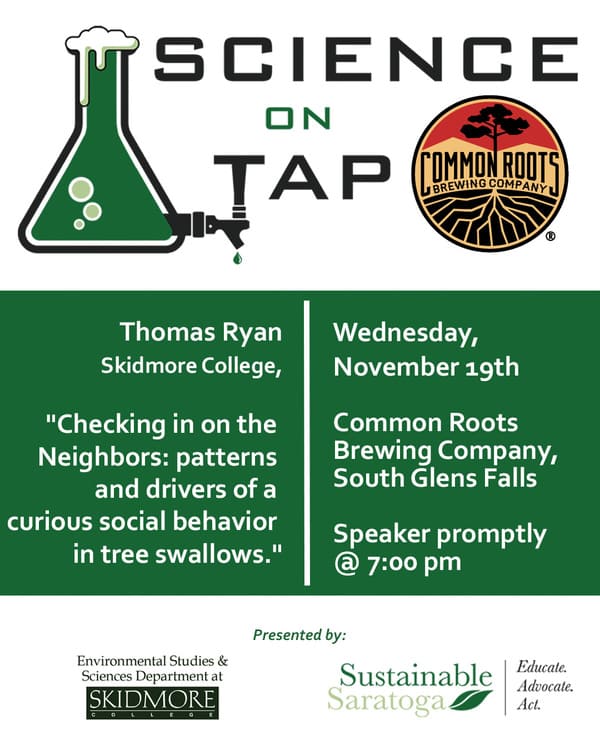Science On Tap is a monthly series of informal talks led by scientists that explore current research topics and the importance of science in our daily life. Each talk takes place in a relaxed pub atmosphere where communication flows freely between scientists and the public. Co-presented by Skidmore’s Environmental Studies and Sciences Department and Sustainable Saratoga, these monthly opportunities for discussion reflect the unique intellectual culture of the greater Capital Region and promote scientific literacy.
The next Science on Tap is Wednesday, November 19 @ 7:00 pm.
Admission is free and all ages are welcome. Come early to get a bite to eat. The talk will start promptly at 7:00pm.
Talk Description – Social nest visitation is a common behavior exhibited by many species of birds.
However, the motivating function underlying the act of peeping into your neighbors’ nest varies
by population and species. Tree swallows have long been known to express this behavior, but
recent advances in radio frequency identification (RFID) technology have enabled the
population-wide, automated tracking necessary to advance our understanding of why some
birds visit their neighbors and why some birds are targets of their neighbors visits. Here, I
present the results of 13 years of automated, RFID-tracking of tree swallow visitation behavior
from the Cornell Experimental Ponds in Ithaca, NY. We explored the explanatory power of
various hypotheses for social visits and further explored how both stress and environmental
factors altered visitation patterns. Finally, I present some thoughts on why this might be an
important and previously underappreciated behavior for tree swallows as a semi-colonial,
obligate secondary cavity nesting and declining species.
Thomas Ryan is an Assistant Lecturer at Skidmore College, who recently defended his Ph.D.
in Ecology and Evolutionary Biology at Cornell University. He obtained his B.S. from SUNY ESF
and, prior to grad school, spent time working—mostly on various species of wood warbler–
with the Smithsonian Migratory Bird Center, Cornell Lab of Ornithology, and Point Blue
Conservation Science, as well as volunteering with various bird-themed research projects in
Jamaica, New Zealand, and Australia. He is broadly interested in the behavioral ecology of birds,
having previously worked on projects that explored brood parasitism, migration, the effects of
climate change on breeding behavior, and the management of endangered birds.


